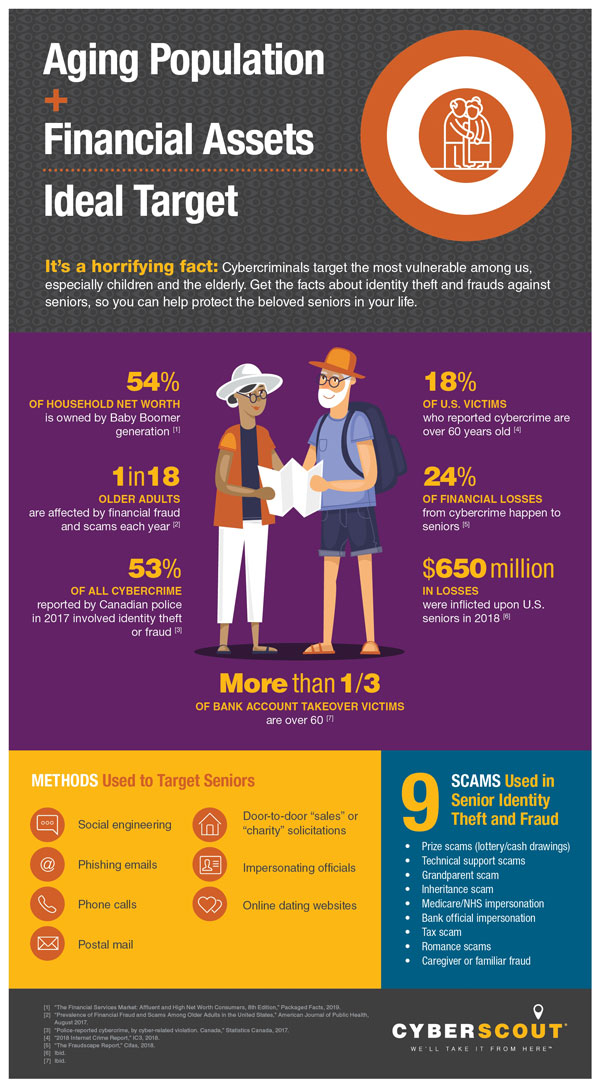 Around the world, seniors are victimized by cybercrime and identity scams at higher rates than most other age groups. Each year, financial fraud and scams affect approximately 1 out of every 18 older adults.
Around the world, seniors are victimized by cybercrime and identity scams at higher rates than most other age groups. Each year, financial fraud and scams affect approximately 1 out of every 18 older adults.
As the Baby Boomer generation enters their retirement years, it’s important to warn seniors about the risk of identity theft and help them stay on guard against fraudulent scams.
Seniors make up 17% of the Canadian population today,(1) and by 2041, 26.5% of the UK population will be 65 or older.(2) By 2050, people aged 65 and older will represent 20% of the U.S. population.(3)
Why do seniors fall victim to identity theft at higher rates than other adults?
Criminals are drawn to seniors for a variety of reasons. Limitations in mobility may keep seniors at home more, creating a sense of loneliness and isolation from family and friends. Some may have memory or cognition difficulties that leave them more susceptible to manipulation. But mostly, identity thieves know that as a group, seniors have greater financial wealth than other generations, therefore the payoff for stealing seniors’ identities can be greater.
Eric Russell, Fraud Analyst at Diamond Credit Union, shared his insights. “Recent studies have shown that older Americans are less likely to report fraud because they do not know who to report it to, don’t know they have been taken advantage of, or are ashamed they have fallen victim. Older Americans also feel that if they report being victims to family members it will lead them to think they no longer have the mental capacity to handle their own affairs (which they feel is one of the last things they can control). Remember, we will all be in this age bracket during our lives so be mindful of what is happening with older family members and help out where you can.”
Nine common scams used to steal identity information and defraud seniors
Educate the seniors in your life about these common scams that identity thieves and fraudsters are using to uncover personal information:
- Prize scams: Fraudsters contact the senior and say they have won a sweepstakes cash prize or lottery and need to make a payment to unlock the prize.
- Technical support scams: A caller, claiming to be from a reputable technology company such as Microsoft or Apple, calls to tell the senior that something is very wrong with their computer. Claiming the computer has been infiltrated by hackers, the caller offers to help in exchange for a fee. People in the U.S. lost $55 million to this scam in 2018.(4)
- Grandchild scam: The scammer calls a senior and then says something like “Hi Grandma, can you guess who this is?” When the senior guesses with the name of one of their grandchildren, the scammer uses that identity to request financial support for anything ranging from bail money to car repairs to overdue rent.(5)
- Inheritance scam: Similar to the prize scams, someone calls pretending to be an attorney and informs the senior they’ve received an unexpected inheritance. Then they press them for personal information.
- Medicare/NHS impersonation: One thing that all seniors have in common is their national health insurance plan. That gives identity thieves one key piece of information about a senior before doing any other research. By impersonating Medicare or NHS personnel, identity thieves get seniors to give out their personal information for “verification” purposes.
- Bank official impersonation: This works very much the same as the Medicare/NHS scam, except the information being captured is bank account numbers in addition to personal information.
- Tax scam: Tax documents contain a trove of personal information, and nearly everyone has to file them. There are two ways identity thieves approach tax scams—by telephone and email. On the phone, the identity thief poses as a tax official and demands payment. Phishing emails look like official communications from the taxing authority with the goal of obtaining personal information for identity theft and possibly stealing refund checks.(6)
- Romance scams: Like any of us, seniors want to pursue love interests and new friendships, and many use online dating websites and social media. Seniors need to be aware that people do create fake online profiles in order to meet potential targets for fraud. Any love interest or new friend who asks for money should be blocked from further contact.(7)
- Caregiver or familiar fraud: Sadly, the elderly often become victims of the very people charged with their care—family members or paid caregivers. It’s important that caregivers be trustworthy people with stable financial footing. Be wary if a caregiver tries to block the families access to a senior or hides bank statements or bills.
Help the seniors you care about watch out for these identity frauds and scams. Talk to them about the dangers and offer to review suspicious emails/mail or to help them look for unusual activity on bank statements and bills. In the event that a senior loved one has recently passed, maintain extra vigilance about the decedent’s credit report and identity in order to protect their surviving spouse and estate.

Diamond has partnered with CyberScout to offer comprehensive identity management services. If you detect suspicious activity or would like to proactively protect your identity, contact us at 610.326.5490 to be connected to a CyberScout fraud expert.
LEARN MORE ABOUT IDENTITY PROTECTION




